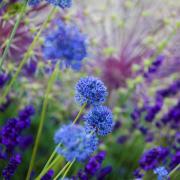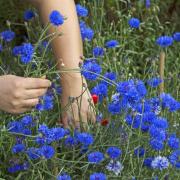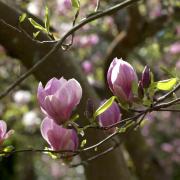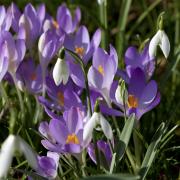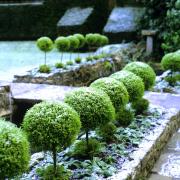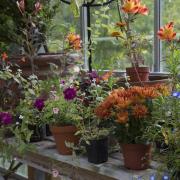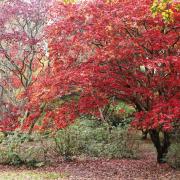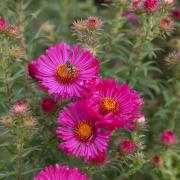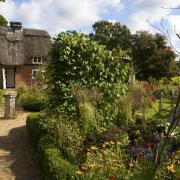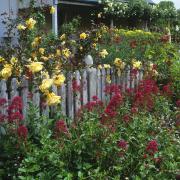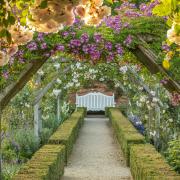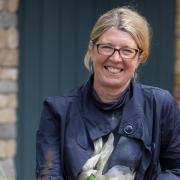We're all aware of the benefits of buying locally and using seasonal home grown food, but what about cut flowers? Leigh Clapp finds out more
Buying cut flowers as gifts or to decorate our homes is still as popular as ever. Cut flowers make us feel good. They help us celebrate special occasions and express sentiments. There is a special joy in receiving or giving flowers. We give a lot of thought to buying locally produced, seasonal food and that is now transferring to other products. Did you know that we import 90 per cent of the flowers we buy? But have we ever wondered what impact their production has on our planet? Grow your ownJust like food – if you home grow or buy local, flowers will generally be fresher and last longer. They are a sustainable antidote to mass-produced refrigerated imported blooms. Flowers also require energy to grow (not just in carbon footprint as they travel from where they are produced). Most of the flowers we buy come from Holland, Kenya, Columbia and Israel.Although we need to consider the income generated for the millions involved, where possible it may be a better option to buy locally produced cut flowers or if you have space, grow some yourself.Our climate is ideal for growing an array of beautiful seasonal flowers. The retail value of the cut flower industry is worth more than �2 billion, the same as our music industry. However, British growers have dwindled over the past 20 years, squeezed out of the market by larger, mono-cultural growing units in Holland and other countries. The trend may be reversing as a national campaign among retailers and growers aims to create awareness. As food producers need our support, so also do our British flower growers. With these thoughts in mind, I set off around Hampshire to answer the question ‘Can we buy locally-grown cut flowers?’ Best of the bunchTalking to florists, retailers, wholesalers and growers as well as trawling the internet, I discovered an array of people actively involved with locally grown cut flowers, from the small scale to a specialist rose grower named Cut Flower Grower of the Year and Best Emerging British Luxury Brand in 2009.There is a range of growers across Hampshire – from backyard hobbyists with stalls by their house, through flowerbeds on open fields to commercial wholesalers. Next time you buy flowers locally, ask where they have come from and support our British flower growers. In these challenging economic times, it continues to be important to support our local businesses.
The Real Flower CompanyAwarded Best Emerging British Luxury Brand 2009 and Cut Flower Grower of the Year 2009, The Real Flower Company was started by Rosebie Morton in 1995 from the walled garden of her husband’s family farm, near Bramdean. Her original aim of growing a range of scented roses, flowers and herbs has developed into a commercial enterprise with a continued, strong ethos. “We want to retain the natural charm, character and heady scent so often lost in mass-produced varieties. The company is dedicated to the small-scale production of flowers that will fill your senses with their unique look, texture and exquisite scent. From tilling, to planting and harvesting, every bed is tended by hand. All stems are individually selected, cut, prepared and tied by the people who grew them, ensuring the highest quality at every stage, from planting through to the beautifully finished bunches,” explains Rosebie.
African dreamsA true Hampshire success story, the Real Flower Company is based at Durleigh Marsh near Petersfield and is managed by Karen Watson, one of the three owner directors. From here the unique scented bouquets are made, using the flowers and foliage grown on the farm in Hampshire and on their sister farm in Kenya. Around 18,000 rose bushes are grown under poly-tunnels and in the fields, along with a wide range of other scented flowers, foliage and herbs, in the picturesque setting of the Hampshire farm; guided by farm manager Rob Marsden. Great care is taken with the production and working in harmony with the environment is a priority – from maintaining the soil, drip irrigation, companion planting, deadheading and harvesting by hand, to encouraging the wildlife with beehives and bird boxes. “We try not to spray, preferring to encourage beneficial insects and I also allow the chickens to wander on ‘pest patrol’,” adds Rob. Joining forces with Tim Hobbs, the owner of the ethically principled ‘fair trade’ Nanyuki farm, one of the few Kenyan flower farms to have been made a gold member of the internationally respected Kenyan Flower Council, has allowed year round supply. It is interesting to note that the Kenyan farm prides itself in being carbon neutral, shipping the blooms in passenger planes and using sustainable water sources.
Floral fantasticRosebie’s passion lies very much with the plants and particularly the roses that they specialise in, while Karen who has a background in fashion and was once the buying director for Harvey Nichols, is the retail expert. “I have loved old, garden roses since childhood. My mother was and still is a brilliant gardener, my first memories are the scent of the roses in our garden. We were an army family so moved all over the world but she always managed to have some beautifully scented roses growing and the table always had a wonderful mix of roses and interesting foliages in season,” recalls the appropriately named Rosebie.The range of plants grown continues to expand. “We are always trialling new roses recommended by either Robert Harkness or Peter Beales. We try a few each year and experiment with them in our bouquets and if we like them then we will put in several hundred this autumn. ‘Margaret Merril’ an ivory creamy blush coloured rose, is one of our most popular owing to its incredible beauty and scent which is slightly citrus and irresistible. With other plants, new additions include a heavily scented hosta which smells and looks like a lily and a fantastic Echinacea which is the colour of tomato soup,” Rosebie adds.Customers can buy bouquets of roses, seasonal flowers and herbs from the website or by telephone. They are also welcome to collect from the workshop at Durleigh Marsh. Individually tailored floristry is available for weddings and events. They also have a shop in Selfridges’s food hall in London, with flowers delivered the same day by green transport – a pedal-powered trike.
Make your flowers last for longer• Cut early morning before morning dew has dried, when their stems are filled with stored food. Flowers gradually dehydrate as the day warms up.• Cut on a slant of about 45 degrees.• Remove leaves that will be under water.• Plunge immediately into lukewarm water.• Change the vase water every two days.• Keep out of direct sunlight.• Different types of flowers are harvested at appropriate stages in their development. Flowers with multiple buds on each stem should have at least one bud showing colour and one bud starting to open before being cut. Flowers that grow on individual stems should be cut when open.• Use a clean, sharp knife or shears• Cut long stems, about one inch from the bottom of the main stem.• Keep away from fruit, which releases ethylene, a gas that causes flowers to age faster.• Home made flower preservative can be added to the water – 1 tspn sugar, 1 tspn bleach, 2 tspns lemon juice to approx. one litre of water.
Top tips to flourish at home• Select a sunny spot with well-drained fertile soil and sheltered from strong winds.• Grow a mix of annuals and biennials with perennials as the backbone to your supply.• Use self-replenishing plants that will produce more flowers after cutting.• Cutting encourages more flowers to grow.• Sow seeds or plant seedlings.• Ensure you can reach the flowers easily with wide paths.• Combine plants of similar heights and flowering times.• Stake plants if needed.• If using existing borders plant large groups so cutting some of the blooms won’t spoil the garden.• Use a cutting garden to experiment with new plants and colours.• As it is primarily a production garden you don’t need to worry about design and colour combinations.• Some people choose to grow in rows like traditional vegetable plots for ease of maintenance.
Plant suggestionsAchillea, allium, alstroemeria, ammi majus, bells of Ireland, calendula, campanula, cleome, cosmos, coreopsis, dahlia, delphinium, echinacea, gladioli, gypsophila, helichrysum, phlox, poppy, rudbeckia, salvia, scabiosa, snapdragon, sunflower.



